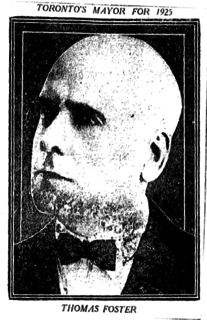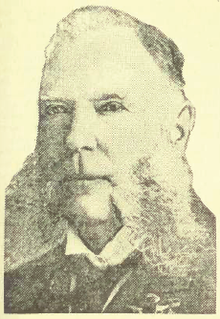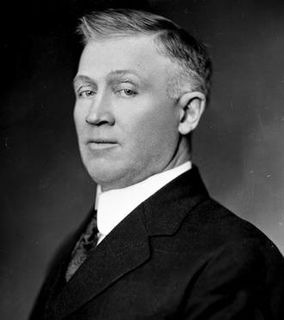
Toronto City Council is the legislative body of the municipal government of Toronto, Ontario. It comprises 25 city councillors, who are elected to represent various wards throughout the city, and the mayor of Toronto – presently John Tory – who is elected city-wide, and serves as head of council. Toronto City Council currently meets at the Toronto City Hall, at 100 Queen Street West.
William Donald Dennison was a Canadian social-democratic politician that served in both the Ontario Legislative Assembly and finally as the City of Toronto's mayor. He served two nonconsecutive terms as a Member of Provincial Parliament (MPP) in the 1940s and early 1950s. After his provincial-level career, he focused on Toronto's municipal politics, holding offices as an alderman, member of the Toronto Board of Control, and finally as the city's mayor. He was the mayor from 1967 to 1972, winning two consecutive three-year terms. Prior to entering politics, he was a school principal and teacher. As of 2020 he was the last mayor of Toronto to be a member of the Orange Order.
Alan Tonks is a former Canadian politician. He was the Liberal MP for the federal riding of York South—Weston in Toronto from 2000 to 2011, and was the final Metro Toronto Chairman before the amalgamation of Metro Toronto into the new City of Toronto.

Thomas Foster was the Mayor of Toronto, Ontario, Canada from 1925 to 1927.

Robert Hood Saunders, CBE, QC was mayor of Toronto from 1945 to 1948, President of the Canadian National Exhibition, chairman of the Ontario Hydro. He was also a member of the Orange Order in Canada.
Leslie Howard (Les) Saunders was Mayor of Toronto, Canada, from 1954 to 1955 and the last member of the Orange Order to hold the position until William Dennison. He also served as Mayor of East York in 1976.

John Shaw was Mayor of Toronto from August 6, 1897, to January 1, 1899.
The Toronto municipal election of 1976 was held on December 6, 1976 in Metropolitan Toronto, Ontario, Canada. Mayors, city councillors and school board trustees were elected in the municipalities of Toronto, York, East York, North York, Etobicoke and Scarborough.

Joseph Andrew Clarke was a Canadian politician and lawyer. He served twice as mayor of Edmonton, Alberta, was a candidate for election to the House of Commons of Canada and the Legislative Assembly of Alberta, and was a member of the Yukon Territorial Council.

Francis Henry Medcalf was a Canadian millwright, iron founder, and Mayor of Toronto during the periods 1864–1866 and 1874–1875. He was also a member of the Orange Order in Canada.

Municipal elections were held in Toronto, Ontario, Canada, on December 1, 1969. Across Metro Toronto there were few surprising results, and city of Toronto incumbent mayor William Dennison was easily re-elected. The one dramatic exception to this was on Toronto city council, where a number of long-standing members lost to young new arrivals who shared a common vision of opposition to the megaprojects that had transformed Toronto throughout the post-war period. While the reform movement candidate for mayor lost, it gained a strong presence on city council. The 1970s reform faction dominated Toronto politics for the next decade.
The Board of Control of Toronto, Ontario, Canada, was a part of its municipal government until it was abolished in 1969. It served as the executive committee of the Toronto City Council. When it was initially created in 1896 by mandate of the provincial government, it consisted of three Controllers appointed from and by the aldermen, and presided over by the Mayor of Toronto. Beginning in 1904, the Board of Control was directly elected by the city's electorate and consisted of four Controllers, presided over by the Mayor. Each voter could vote for up to four candidates, and the four with the most votes were elected. By tradition the controller who received the most votes would get the powerful budget chief position.
Municipal elections were held in Toronto, Ontario, Canada, on December 3, 1951. Allan Lamport defeated incumbent Hiram E. McCallum in the mayoral election.
William Arthur Summerville was a municipal and provincial politician in Ontario, Canada. He was a Progressive Conservative member of the Legislative Assembly of Ontario from 1937 to 1943 who represented the downtown Toronto riding of Riverdale. From 1922 to 1937 he was a municipal politician in Toronto.
Joseph Singer, K.C., was a Toronto city councillor, lawyer and prominent figure in the city's Jewish community. He was the third Jewish candidate to be elected to Toronto City Councillor, and the first Jew to win citywide election to the Toronto Board of Control.
William Lee Archer, (1919–2005) was a Toronto politician and lawyer.
F. Joseph Cornish Q.C. was a lawyer, judge and Toronto politician who served as alderman for Ward 2 and as a member of the Toronto Board of Control as well as a Metro Toronto Councillor.
Municipal elections were held in Toronto, Canada, on January 2, 1899. Mayor John Shaw was elected for his third consecutive term in office defeating opponent Ernest A. Macdonald and Third Ward Alderman George McMurrich. It was Macdonald's third unsuccessful attempt to be elected mayor. He would succeed in his fourth attempt, at the 1900 Toronto municipal election.
Christopher Alexander Tonks was a long-time politician in the Toronto municipality of York, Ontario from 1949 to 1988. He served as reeve of the then-Township of York from 1957 to 1960, when he was unseated by a court order due to a conflict of interest scandal involving his house which was built on land purchased from the township. He attempted to regain the reeveship several times in subsequent municipal elections but was unsuccessful. He returned to council as a borough alderman in 1967, was defeated in 1969, and then returned to council again as an alderman for Ward 5 in 1972, where he remained until his retirement in 1988. He is the father of Alan Tonks, who served as mayor of York during the elder Tonks's final years as an alderman, and went on to be Metropolitan Toronto Chairman, and then Member of Parliament for York South.
Roy E. Belyea was a political and business figure in Toronto. A long-time Toronto City Councillor and member of council's executive, the Toronto Board of Control, he challenged incumbent Nathan Phillips for the mayoralty in 1955.







